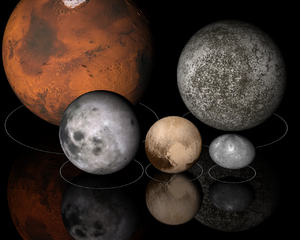 Image via Wikipedia
Image via WikipediaNow that Pluto may have regained its status as the largest object in the outer solar system, should astronomers consider giving it back another former title — that of full-fledged planet?
Pluto was demoted to a newly created category, "dwarf planet," in 2006, partly because of the discovery a year earlier of Eris, another icy body from Pluto's neighborhood. Eris was thought to be bigger than Pluto until Nov. 6, when astronomers got a chance to recalculate Eris' size.
Now it appears that Pluto reigns — though only by the slimmest of margins (the numbers are so close as to be nearly indistinguishable, when uncertainties are taken into account).
The new finding brings renewed attention to Pluto, and to the controversial decision to strip the frigid world of its planet status. Should Pluto be a planet? Should Eris, and many other objects circling the sun beyond Neptune's orbit? Or is the current system, which recognizes just eight relatively large planets, the way to go?
The battle over Pluto's planethood may be more semantic than anything else. But words do matter, because they shape how people classify and understand reality.
"You have to be able to sort," Stern said.
Tyson said he tries not to use the word "planet" in its traditional, generic sense too much, because it doesn't convey very much meaningful information. It's more revealing to group objects that are similar in size, composition and other properties.
"The word 'planet' has far outlived its usefulness," Tyson told SPACE.com. "It doesn't celebrate the scientific richness of the solar system."
So Tyson thinks in categories such as gas giants (Jupiter, Saturn, Uranus and Neptune) and terrestrial planets (Mercury, Venus, Earth and Mars) as well as asteroids and Kuiper Belt objects (Pluto, Eris and many others).
For his part, Brown thinks stripping Pluto of its planethood doesn't make the icy body any less interesting or important.
"I think that Pluto as an example of a large Kuiper Belt object is so much more interesting than Pluto as this very weird planet at the outer edge of the solar system unlike anything else," Brown said. "We are going to learn so much more about the solar system with our new understanding of what Pluto is."
Maybe Stern and other scientists fighting for Pluto's planethood would agree. Or maybe not.

No comments:
Post a Comment